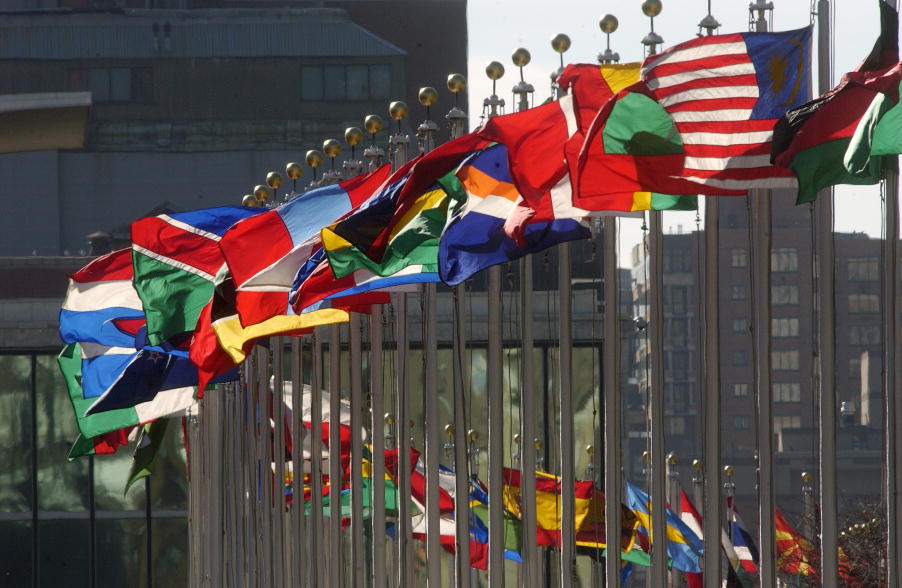The international community of states intends to achieve the global Sustainable Development Goals by 2030. However, the worldwide pandemic is setting back many states’ action plans – and multilateralism is not faring well in the current environment.

Flags of member nations flying at United Nations Headquarters in New York. Photo: UN Photo/Joao Araujo Pinto
COVID-19 has had the world on tenterhooks for months. Some states seem to have contained the pandemic, while others are desperately fighting the virus as their infection rates soar. Yet others are already in the midst of a second wave. Most countries in the Global South imposed lockdowns very early on and are now dealing with the pandemic’s devastating indirect social and economic consequences. Coronavirus is battering the community of states at a time when it needs to be focusing all of its energy on achieving the 17 Sustainable Development Goals (SDGs) of the United Nations (UN). By 2030, hunger and poverty should be eliminated around the world, climate protection targets should be reached, education should be accessible for all, and gender equality should be achieved.
Between 7 and 16 July, state representatives and experts – primarily from non-governmental organisations – met at the High Level Political Forum on Sustainable Development (HLPF). The annual event is the United Nations’ most important platform for reviewing progress in implementing the UN Sustainable Development Goals in the run-up to 2030. This year’s forum focused on initiating a decade of action in which the implementation of the SDGs should be accelerated. The meetings were held virtually this year to prevent spreading coronavirus. Experts believe that this also made the forum more inclusive: the virtual format enabled a large number of players to take part who would otherwise have been unable to attend due to the expense associated with travelling to New York.
47 states presented their voluntary national reviews (VNR) setting out their progress with regard to the UN Sustainable Development Goals. Coronavirus dominated the debates concerning action plans and the way in which the international community of states can respond to the pandemic while remaining on course for 2030.
COVID-19 thwarts the fight against poverty
There is great concern that the progress made to date will be undone by the spread of coronavirus. In particular, the number of people living in poverty is expected to rise. Experts in development policy and healthcare expect the impact of the pandemic to be visible for generations to come. Measures to restrict the spread of COVID-19 and long-term development plans must go hand in hand to end poverty and hunger around the world, urged delegates at the UN forum. Efforts to ensure access to good healthcare, protection from fatal diseases, and high-quality education must be stepped up, they said. Cristina Duarte, the UN’s Special Advisor on Africa, emphasised that cooperation and dialogue between various stakeholders were needed to achieve this. “It is time political decision-makers set priorities for the development of humanity.”
In her contribution to the UN forum, Imme Scholz, member of the German Council for Sustainable Development (RNE) and Acting Director of the German Development Institute (DIE), highlighted the direct link between tackling poverty and protecting the climate.
As the population grows, emissions of carbon dioxide also increase. At the same time, a large number of people are living in poverty. To become more sustainable, rich states need to reduce their consumerism and switch to recycling or renewables, said Scholz.
An analysis by the German Development Institute examined 53 developing countries. Although 70 per cent of these states improved their poverty rates within a 15-year period (2000 to 2015), this was done at the expense of climate protection. Uruguay and Costa Rica achieved the best results. Both countries focused on education and health programmes, as well as investing in renewable energies. Scholz called for others to follow these examples to avoid pitching poverty eradication against climate protection in the 21st century. There is a risk of precisely this happening: due to a lack of consensus among the states, there will be no political declaration by the HLPF this year. This means that there may be no declaration on the 2030 Agenda – in the UN’s 75th anniversary year. That would be a sorry sign for multilateralism.
Vulnerable health systems
COVID-19 showed how susceptible health systems are, all around the world. Vulnerable groups in particular – especially children, women, elderly people and the disabled – were not protected sufficiently, said Githinji Gitahi, Global CEO of AMREF Health Africa, an organisation dedicated to improving healthcare on the African continent. Gitahi called for not just general health systems to be strengthened, but also individual communities and prevention programmes. “Health starts at home,” said Gitahi.
The 17 UN Sustainable Development Goals were adopted in 2015. They now form the heart of the 2030 Agenda for Sustainable Development and can be traced back to the UN Conference on Environment and Development in Rio de Janeiro 1992. The goals apply equally to all states around the world and give equal weight to the three aspects of sustainability, i.e. social, economic and environmental considerations. In Germany, the National Sustainable Development Strategy is the framework for implementation of the Agenda.
In September, the German Council for Sustainable Development (RNE) will discuss the state of implementation of the UN Sustainable Development Goals in an online forum with RNE members and other experts. Germany is expected to publish its voluntary national review with respect to the 2030 Agenda in the coming year. Furthermore, the German Sustainable Development Strategy is currently being revised, with the RNE recommending that it should also include Germany taking greater international responsibility for global sustainability policy.